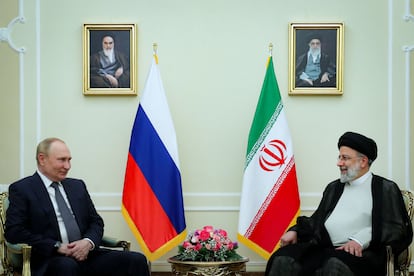The nightmare of connecting war fronts in Europe, the Middle East and the Asia-Pacific
The world is facing an ongoing war in Ukraine, the danger of an escalating conflict between Israel and Iran and serious tensions in East Asia

On Saturday night, Iran launched its response to Israel’s recent attack against its consulate in Syria. The episode is a new, serious step in a dangerous escalation of the war in the Middle East. But the confrontation between Israel and Iran does not only have a regional dimension. It is also an explosive agitator of a global panorama, where there is ongoing conflict in Europe and rising tensions in the Asia-Pacific. And the more or less visible lines that interconnect these issues are complicating the situation even further.
The form of the Iranian offensive — a multitude of drones deployed simultaneously, the same tactic Russia uses against Ukraine precisely with Iranian-made devices — is a reminder of these interconnections.
The map of global powers provides a clear vision of this. On the one hand, there is the increasingly close coordination of Asian powers: China, Russia, Iran and North Korea. Russia, of course, has a good part of its territory in Europe, but geopolitically it is aligned with the Asian regimes. It receives weapons from Iran and North Korea and economic and political support from China, which believes a Kremlin defeat would be a win for democracies that threatens its interests. Washington on Friday denounced that Beijing is supplying Moscow with engines for drones and cruise missiles, and machinery to manufacture ballistic missiles. There are no formal mutual defense treaties between these countries, but there is a gradual, consistent closing of ranks. No doubt, Russian President Vladimir Putin is watching with glee as the United States is forced to address a complicated conflict in another region.
On the other hand, surrounding the interconnected Asian regimes, there are the alliances of democratic powers, with the United States connecting the European side — its NATO and EU partners — to the Asia-Pacific, with countries such as Japan, South Korea and Australia. This alliance is also making moves. Washington is strengthening its ties with its Asia-Pacific allies, bolstering treaties and promoting new projects such as AUKUS. Just this past week, the leaders of Japan and the Philippines were at the White House. Beijing, meanwhile, is angrily watching Washington’s efforts, which it claims are aimed at containing its legitimate rise and progress.
It is not a battle between two defined blocs. The Asia bloc is not a formal unit. And while the Western bloc is, there are no univocal positions. There is, however, increasingly tense competition between authoritarian regimes and democracies.
In this problematic context, we must remain alert to the risk of a third front opening in Asia-Pacific, which would represent a real geopolitical nightmare. This is not likely. But the way international relations are developing, it would be a serious mistake not to reflect on the possibility. That is, the risk that someone in the region thinks that it is a good time to advance their interests in the Asia-Pacific, while the U.S. and Europe are preoccupied with the war in Ukraine and the Middle East.
There are no lack of hotspots in the region. The Philippines is one: it recently saw serious clashes with the Chinese coast guard over disputed waters. China is blocking supplies for sailors who crew an old, rusty Philippine ship that was purposefully run aground on a reef that Beijing claims is its own territory. A very dangerous situation, considering that the Philippines has a mutual defense treaty with the United States.
China’s territorial disputes
Of course, there is much more, from the most consequential issue of all — Beijing’s goal of reunifying Taiwan — to the hair-raising lurches of nuclear North Korea, whose leader recently ordered the removal of the Constitution’s reference to a peaceful reunification of the peninsula, a sign experts consider ominous. Then there are the many frictions and territorial disputes between China and its neighbors.
The opening of a third front is not likely. Logic suggests that China, the key actor, has no rational interest in doing this. In recent months, Washington and Beijing have shown signs of their willingness to put a stop to the sharp deterioration in their relations. It is even likely that North Korea, whose ways of making rational decisions are more dubious, has no interest in disruptive actions.
The problem is that in geopolitics — and in life — high-stress situations lead to a greater margin for unforeseen events, errors in calculation and communication, uncontrolled actions by minority factions and escalations that are unintended, at least by the key players. History is proof of this, and the very escalation in the Middle East demonstrates it.
Iran is an authoritarian regime that oppresses its citizens, secretly develops a nuclear program and causes uproar abroad, but it is quite evident that, in the current case, it has not sought a regional escalation of the conflict. Neither Tehran nor its main proxy, Hezbollah, took advantage of the conflict in Gaza to vigorously attack Israel. The U.S. has also made clear efforts to prevent the conflict from escalating. When U.S. troops were hit at a base in the region, it responded in a timely, measured manner, almost as if they were giving forewarning. Iran’s attack last Saturday night also seemed to be aimed at showing that it was responding, but trying to avoid escalation.
But amid these tense dynamics, things can get accidentally out of control when individuals — within the large group of players — take actions based on what is best for them. In the Middle East, Benjamin Netanyahu has an interest in continuing the conflict, as his position in power depends on it. As soon as the situation calms down, the most likely outcome is that the Israeli prime minister will fall into ignominy. Similarly, the Houthis, another of Iran’s allies, have maintained a belligerent attitude that clearly responds more to their interests than to Tehran’s orders.
This is not likely to happen in Asia-Pacific. It’s improbable not only because it goes against humanitarian logic and reason, but also due to the calculation of interests, such as powerful economic motivations. China has a vested interest in ensuring the stability of the global economic system, as it is key to its ability to continue down the path of progress and prosperity. But in this equation, the risk variable is greater than it was in the past. In these calculations, it cannot be ruled out that someone at some point will consider making a daring move, if the situation in Europe and the Middle East worsens and the United States and Europe continue to be weighed down by their efforts on these fronts.
Sign up for our weekly newsletter to get more English-language news coverage from EL PAÍS USA Edition
Tu suscripción se está usando en otro dispositivo
¿Quieres añadir otro usuario a tu suscripción?
Si continúas leyendo en este dispositivo, no se podrá leer en el otro.
FlechaTu suscripción se está usando en otro dispositivo y solo puedes acceder a EL PAÍS desde un dispositivo a la vez.
Si quieres compartir tu cuenta, cambia tu suscripción a la modalidad Premium, así podrás añadir otro usuario. Cada uno accederá con su propia cuenta de email, lo que os permitirá personalizar vuestra experiencia en EL PAÍS.
¿Tienes una suscripción de empresa? Accede aquí para contratar más cuentas.
En el caso de no saber quién está usando tu cuenta, te recomendamos cambiar tu contraseña aquí.
Si decides continuar compartiendo tu cuenta, este mensaje se mostrará en tu dispositivo y en el de la otra persona que está usando tu cuenta de forma indefinida, afectando a tu experiencia de lectura. Puedes consultar aquí los términos y condiciones de la suscripción digital.









































